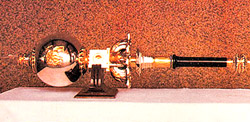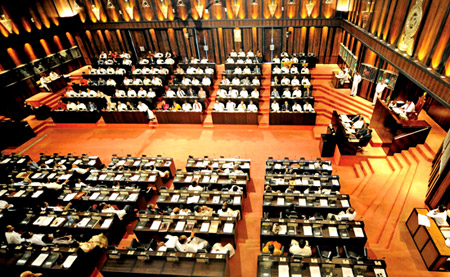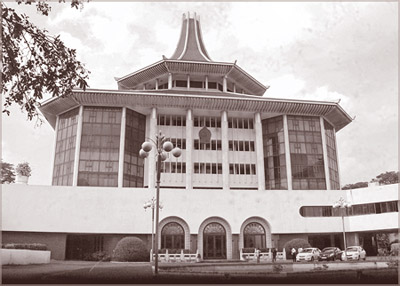Judgement denies Constitution; Parliament’s turn to correct it
 H.L.D. MAHINDAPALA H.L.D. MAHINDAPALA
 Parliament and the Supreme Court have produced two different
findings, both claiming to be vested with the superior authority to
overrule the other. Both are loaded with heavy political baggage. Both
rely on arguable principles denying the legitimacy of the other. Both
are competing for supremacy. Parliament and the Supreme Court have produced two different
findings, both claiming to be vested with the superior authority to
overrule the other. Both are loaded with heavy political baggage. Both
rely on arguable principles denying the legitimacy of the other. Both
are competing for supremacy.
This comment, however, is to explore the judgement delivered by the
Supreme Court which predictably has relied on tenuous legal technicality
argued to deny the right of Parliament to investigate charges against
the Chief Justice Dr. Shirani Bandaranayake. The judgement is a direct
move to downgrade the powers of Parliament and to elevate the judiciary
as the sole authority to judge the judges. Coincidentally, this is also
a move that would go to protect the job of the Chief Justice. She is at
the centre of this contest. Apart from all the principles bandied about
it is her personal role that sparked off the crisis. The invoking of
principles is secondary to the primary role of keeping her in the job.
Victory or defeat will be measured by her fate.

The first finding made by Parliamentary Select Committee (PSC)
accepts Article 107 (2) and (3) as the final authority, without any
intervening interpretations, for investigating the allegations against
the Chief Justice and reporting it to Parliament and the President.
The Supreme Court rephrases this finding in its judgement when it
says "a Judge of the Supreme Court or of the Court of Appeal…… is not
removable by the Executive; the only way he can be removed is by an
order of the President in terms of Article 107 (2)." This means that the
President is solely dependent on Parliament to select its method of
investigating (i.e., either by law or by Standing Orders) the
allegations against the Chief Justice and reporting the findings to the
President upon which he is entitled to decide on his next course of
action.
The second is the new interpretation given on January 1, 2013 by the
Supreme Court which states that the PSC, appointed by Parliament, "has
no legal power or authority to make a finding adversely affecting the
legal rights of a Judge".... because "the power to make a valid finding,
after the investigation contemplated in Article 107(3), can be conferred
on a court, tribunal, or a body, only by law (an Act of Parliament) and
by law only." The argument here is that the Standing Orders, which
created the PSC, came out of resolutions passed by Parliament for the
conduct of Parliamentary proceedings and affairs and not through an Act
of Parliament which confers judicial powers like courts and tribunals
etc.
Therefore, the argument of the Supreme Court states, that the PSC has
not been conferred by law the powers of courts and tribunals to
investigate the charges. Consequently, the PSC is not a legally
constituted body to investigate allegations made against the Chief
Justice and therefore, its finding cannot be the law.
Standing Orders There is, however, one essential point missing in
this argument. The law in the Constitution (107 (3) states categorically
that it is the Parliament that must decide whether it should investigate
it "by law or by Standing Orders". The phrasing in 107 (3) states:
"Parliament shall by law or by Standing Orders" (emphasis added).
The Supreme Court in its judgment takes an intriguing stand: it takes
the first part (i.e, "Parliament shall by law") and deliberately omits
the equally valid second part which states "or by Standing Orders".
Why? Why does the Supreme Court which states that they had "performed
(their) duty faithfully bearing in mind the Oath of office (they) had
taken when (they) assumed the judicial office".... "in a spirit of
detached objective inquiry" taken only the first of a sentence that
supports their line of argumentation to eliminate the Standing Orders as
a legitimate institution enshrined in the Constitution and not the
second part which could not have been missed even by a blind man’s blind
dog? More of this later.
|

Parliament is supreme |
Before going any further, it is necessary to emphasize that the
current panic caused by taking the Supreme Court judgement as the final
word on the subject is sheer hysteria not based on reality.
This is only one side of the story given by one court. This is
appealable and there are higher courts which can still argue against it.
Besides, the Parliament, the supreme law-making body, too has to
evaluate the judgement and give its response. So this is not the end of
the world as panic-mongers in our times and island make it out to be.
All relevant issues are still in a fluid state.
The provisional judgement made by the Supreme Court has neither the
power nor the legal acceptance in the relevant quarters that matters to
be enforced as the decisive, incontrovertible, inviolable law dealing
with the impeachment of the Chief Justice. Despite the Order of the
Supreme Court going in favour of the Chief Justice her case is still
hanging in the balance, waiting for finality.
It is quite apparent from the direction taken by the legal team of
the Chief Justice that its main aim was to prevent the investigation
made by the PSC into the allegations levelled against the Chief Justice.
So they proceeded to target Article 107 (3) because they perceived it to
be the most vulnerable point in the Constitution to stop the
investigations of the PSC. It was a clever tactical move: once the
investigations of the eleven members of the Parliamentary Select
Committee were stopped there can be no case to remove the Chief Justice.
From the point of view of the legal team this obviously was the best
available legal technicality to protect her from being investigated. If
it succeeds it would not only save her job but also keep her image
clean. So their concerns were summarized by the Appeals Court into the
following question and sent to the Supreme Court for a clarification of
the constitutional issues involved:
“Is it mandatory under Article 107(3) of the Constitution for the
Parliament to provide for matter (sic) relating to the forum before
which the allegations are to be proved, the mode of proof, burden of
proof, standard of proof etc., of any alleged misbehaviour (sic) or
incapacity in addition to matters relating to the investigation of the
alleged misbehaviour (sic) or incapacity?”
Misbehaviour or incapacity
Earlier the Court had asked Parliament not to proceed with the
investigations until the Court had made a determination on the issues
before the Court. Parliament rejected it saying that the Courts had no
right to interfere in the affairs of Parliament. In the meantime, the
Attorney-General and his team made an ill-considered intervention saying
that the power of the removal of the Judges of the superior courts was a
power vested in Parliament.
The Judges quite correctly dismissed this argument saying: "There is
a constitutional right given to the Members of Parliament to move a
resolution containing the allegations of misbehaviour or incapacity
against a Judge of the Supreme Court and the Court of Appeal and the
right to make an address of Parliament to be presented to the President
for the removal of such Judge for proved misbehaviour or incapacity. The
power of removal of such Judge is a power of the President."
|

Supreme Court complex |
Now this statement contains three significant issues relevant to the
case: 1. it says that the MPs have a right to move a resolution
containing the allegations of misbehaviour or incapacity against the
judges of the superior courts and 2. MPs have the right present their
findings to the President for the removal of the judges and 3. the
ultimate power of removing the judge is with the President and not the
Parliament. However, at this point it is silent on the key issue of MPs
right to investigate the allegations. The answer to it is given later
when the Supreme Court states in answer to the question posed by the
Appellate Court:
“It is mandatory under Article 107(3) of the Constitution for the
Parliament to provide by law the matters relating to the forum before
which the allegations are to be proved, the mode of proof, burden of
proof and the standard of proof of any alleged misbehaviour or
incapacity and the Judge’s right to appear and to be heard in person or
by representative in addition to matters relating to the investigation
of the alleged misbehaviour or incapacity.”
In other words, the judgment states that the PSC consisting of MPs do
not have the legal force of courts and tribunals to investigate the
judges because they have been appointed under Standing Orders which is
not the law. It is not the law because it has not been passed by an Act
of Parliament. Citing Article 170 it says that the law can come from an
Act of Parliament.
That is true. But this leads to a questions that contradicts the
position taken by the Supreme Court in relation to Article 170 (3). It
has two parts to it which states that “Parliament shall by law” or by
“Standing Orders”. Since both are in the Constitution -- the supreme law
-- can only one part be the law and not the other? But the judgement
grabs only the “law” and runs with it to the end leaving the Standing
Orders” because it technically not law declared in Article 170.
According to the judgment there should be another Act of Parliament
to make it the “law” even though the Constitution has equated both on
the same footing. It ignores the fact that Standing Order 78 A has its
birth in Article 107 (3) -- the supreme law. Not knowing how to handle
this Constitutional impediment the judgement tries to hop, step and jump
over it by focusing only on the provision of the “law”. If the judgement
gave equal weight to the Standing Orders as it did to law then there was
no way it could have denied the legitimacy of the PSC established under
Standing Orders.
The conjoined phrase “...or by Standing Orders” places the PSC on the
same footing as the courts, tribunals etc. There was no way that the
judgement could marginalize or refuse to recognize what is written down
in the Constitution unless it is written struthiously (ostrich-like) to
deliberately ignore the obvious.
Constitutional powers
Once you turn a blind eye to the parallel authority established by
the Constitution (.i.e., the Standing Orders which gave birth to
Standing Order 78 A) it is a piece of cake to justify only “the law” as
the only valid instrument to pursue investigations. The Supreme Court
solves it problem of facing the hard reality of “..or by Standing
Orders” with the struthious tactic of pretending that it does not exist.
For instance, the judgment says that the Standing Orders are not law
within the meaning of Article 170 of the Constitution which defines what
is meant by “law”. That is true. But the Standing Orders do not have to
derive its legality from Article 170 because Article 107 (3) has already
enshrined Standing Orders with the equal status as courts, tribunals
etc.
The Constitution has left open the choice to Parliament to either
act(1)through the law and (2)through Standing Orders which in this case
is Standing Orders with 78 A. The Constitution has empowered both with
equal powers. Nowhere does the Constitution that Standing Orders is an
invalid or a lesser force than the law. Article 107 (3) exists in toto
as an independent force of its own despite Article 170. Therefore, a
Select Committee appointed under Article 107 (3) and in terms of
Standing Order 78A has legal power or authority to make a finding as
valid as that of courts or tribunals.
The power to make a valid finding, after the investigation
contemplated in Article 107(3), has been conferred on a court, tribunal,
or by Standing Orders(emphasis added) by the law enshrined in the
Constitution.
Using the slightly amended words of the Supreme Court it can be
argued: “This is the reason why the framers of the Constitution have
advisedly used the words ‘law or by Standing Orders’ when they enacted
Article 107(3) which reads. “Parliament shall by law or by Standing
Orders provide for all matters relating to the presentation of such an
address including the procedure for passing of such resolution, the
investigation and proof of the alleged misbehaviour or incapacity and
the right of such Judge to appear and to be heard in person or by
representative.”
“There is a presumption that Parliament will not use words in vain or
unnecessarily. The reason for the use of the words ‘law or by Standing
Orders’ in Article 107(3) is clear from what we have stated above.
Critical words
“Therefore in our opinion it is mandatory for Parliament to provide
by law or by Standing Orders the Body competent to conduct the
investigation contemplated in Article 107(3) and give a legally valid
and binding finding with regard to the allegations of misbehaviour or
incapacity investigated by it.”
If the judgment adhered to the Constitution the judgement should have
read as stated above. Clearly, Parliament, acting according to 107 (3)
has provided by Standing Order 78 A as the Body competent to conduct the
investigation contemplated in Article 107 (3). From this it is apparent
that the Standing Order 78 A has been introduced to bring the law in
line with the requirements of the Constitution stated in 107 (3). If the
Constitution did not authorise Standing Orders as the legally valid
parallel body to investigate then Parliament would have had no legal
authority to bring in Standing Order 78 A. It was to fulfil this
function that it was introduced in April 4, 1984. Without Standing Order
78 A the provision in Article 107 (3) remains in vacuum. Article 107 (3)
finds its full expression and fulfilment only in Standing Order 78 A. Of
course, some course have been raised about its validity. Those are
questions for the future. But as the law stands now Article 107 (3) and
its corollary Standing Order 78 A remains as the valid instrumentality
to investigate judges.
Now, rather belatedly, the Supreme Court, in a struthious judgment
refuses to even mention its existence. In several places it avoids
mentioning its existence by referring to it as “the body”or “(by
whatever name it is called)”. This is a tactical means of giving
validity only to the word “law” and not the other half which refers to
“the Standing Orders”. The judgment obviously can’t give equal weightage
to both bodies as it would demolish the the argument that investigations
could be done only by “the law”. If, as stated in the judgement one part
of the sentence ( i.e., “the law”) is valid why is the other part,(
i.e., Standing Orders)sitting side by side with “the law”, invalid?
Trapped inside the contradictions of its inner logic the laborious
struggle in the judgement is to the deny constitutional powers vested in
PSC, by denying that part of the Constitution which does not serve the
agenda of the judgement. No objective judgment can exclude the critical
words “....or by Standing Orders” in the Constitution. But that is
exactly what the Supreme Court judgment has done.
A judgment that denies the Constitution stands condemned by the
weight of its struthious partisanship. The validity of its reasoning is
undermined by going into denial. Going into denial and wrapping the
judgment with selected references to the Constitution, which are
advantageous to the agenda of the Supreme Court order, is the
fundamental flaw in the judgment. This flaw of denying the critical
parts of the Constitution does not validate the judgment as a legal
document that should be accepted by Parliament. The duty of both the
Parliament and the Courts is to abide by the supreme law in the
Constitution. Parliament has adhered strictly to every step adumbrated
in the Constitution.
The Supreme Court has tried to overturn it by using only selected
scraps from the Constitution. It is time for the Parliament to correct
it and follow the Constitution, step by step, legally to its logical
end. |







